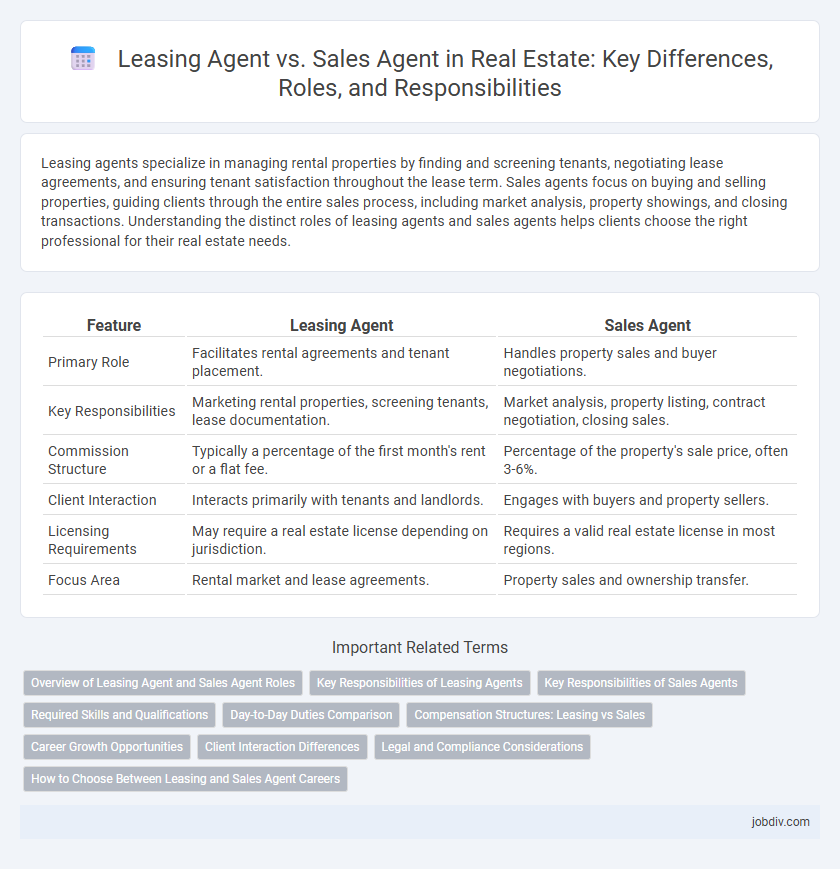Leasing agents specialize in managing rental properties by finding and screening tenants, negotiating lease agreements, and ensuring tenant satisfaction throughout the lease term. Sales agents focus on buying and selling properties, guiding clients through the entire sales process, including market analysis, property showings, and closing transactions. Understanding the distinct roles of leasing agents and sales agents helps clients choose the right professional for their real estate needs.
Table of Comparison
| Feature | Leasing Agent | Sales Agent |
|---|---|---|
| Primary Role | Facilitates rental agreements and tenant placement. | Handles property sales and buyer negotiations. |
| Key Responsibilities | Marketing rental properties, screening tenants, lease documentation. | Market analysis, property listing, contract negotiation, closing sales. |
| Commission Structure | Typically a percentage of the first month's rent or a flat fee. | Percentage of the property's sale price, often 3-6%. |
| Client Interaction | Interacts primarily with tenants and landlords. | Engages with buyers and property sellers. |
| Licensing Requirements | May require a real estate license depending on jurisdiction. | Requires a valid real estate license in most regions. |
| Focus Area | Rental market and lease agreements. | Property sales and ownership transfer. |
Overview of Leasing Agent and Sales Agent Roles
Leasing agents specialize in managing rental properties by marketing vacancies, screening tenants, and handling lease agreements to ensure consistent occupancy and rental income. Sales agents focus on facilitating property transactions, including listing homes, negotiating prices, and guiding clients through contracts to close sales efficiently. Both roles require strong client communication and market knowledge but differ mainly in transactional focus--leasing agents drive rental occupancy, while sales agents handle property sales.
Key Responsibilities of Leasing Agents
Leasing agents specialize in managing rental properties by marketing available units, screening potential tenants, and preparing lease agreements to ensure occupancy and compliance with legal standards. Their responsibilities include negotiating lease terms, coordinating property viewings, and maintaining tenant relationships to maximize tenant retention. Leasing agents also handle rent collection and address maintenance requests, facilitating smooth communication between property owners and tenants.
Key Responsibilities of Sales Agents
Sales agents specialize in marketing properties, negotiating sales contracts, and facilitating property transactions to ensure clients secure the best deals. They conduct property showings, provide market analysis, and prepare offers and counteroffers to meet client needs. Their expertise in customer relations and local market trends drives successful closings and maximizes client satisfaction.
Required Skills and Qualifications
Leasing agents require strong interpersonal communication, knowledge of lease agreements, and proficiency in property management software to effectively match tenants with rental properties. Sales agents must possess in-depth real estate market knowledge, negotiation skills, and licensing credentials such as a real estate salesperson license to facilitate property sales. Both roles benefit from customer service expertise and understanding of local real estate laws and regulations.
Day-to-Day Duties Comparison
Leasing agents primarily handle tenant screening, lease negotiations, and property showings to secure rental agreements, ensuring occupancy and managing tenant relations. Sales agents focus on marketing properties, conducting open houses, and guiding clients through the buying process, including contract negotiations and closing procedures. Both roles require strong communication skills but differ in client interaction frequency and transaction types, with leasing agents managing ongoing tenant needs and sales agents facilitating one-time property sales.
Compensation Structures: Leasing vs Sales
Leasing agents typically earn a fixed salary or hourly wage supplemented by bonuses tied to the number of lease agreements signed, emphasizing consistent income from rental transactions. Sales agents often work on a commission basis, receiving a percentage of the property's sale price, resulting in potentially higher but variable earnings dependent on successful property sales. Understanding these distinct compensation models is crucial for professionals when selecting a career path in real estate focused on either leasing or sales.
Career Growth Opportunities
Leasing agents often gain foundational experience in tenant relations and property management, providing a pathway to property supervisor or property manager roles. Sales agents focus on closing property transactions, with potential to advance into brokerage ownership or senior real estate consultant positions. Both career paths offer distinct growth opportunities in real estate, with sales agents typically commanding higher income ceilings and leasing agents building critical operational expertise.
Client Interaction Differences
Leasing agents primarily engage with tenants to facilitate rental agreements, emphasizing lease terms, property features, and tenant needs. Sales agents focus on homebuyers and sellers, providing market analysis, property valuations, and negotiation strategies to close real estate transactions. The client interaction for leasing agents is often ongoing throughout the lease term, while sales agents typically have interaction concentrated around the buying or selling process.
Legal and Compliance Considerations
Leasing agents primarily navigate lease agreements, ensuring compliance with local rental laws, fair housing regulations, and tenant-landlord statutes, while sales agents must adhere to property disclosure requirements, contracts governed by real estate licensing laws, and anti-fraud provisions. Both roles require a thorough understanding of state-specific legal frameworks, but sales agents often face stricter regulations regarding marketing representations and financial transactions. Maintaining compliance reduces legal risks and protects both agents and clients in property leasing and sales processes.
How to Choose Between Leasing and Sales Agent Careers
Choosing between a leasing agent and a sales agent career depends on your strength in client interaction and preference for short-term or long-term transactions. Leasing agents focus on securing rental agreements and maintaining tenant relationships, ideal for those skilled in negotiation and tenant retention. Sales agents specialize in property sales, requiring expertise in market analysis and contract negotiation, suited for individuals aiming for higher commissions and complex deals.
Leasing Agent vs Sales Agent Infographic

 jobdiv.com
jobdiv.com